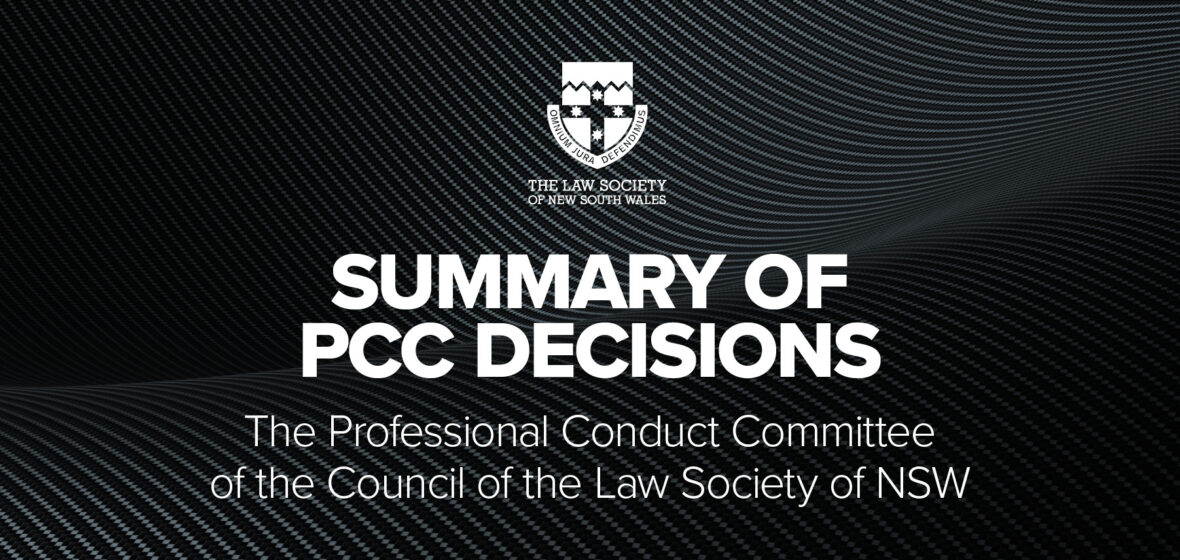The Professional Conduct Committee (PCC) of the Council of the Law Society of NSW (Council), under delegation from the NSW Legal Services Commissioner and the Council, deals with complaints referred to the Council by the NSW Legal Services Commissioner. A total of 60 matters were finalised during the January – March 2025 quarter.
There were two disciplinary matters determined this quarter which involved the following conduct issues:
- Contacting another solicitor’s client directly; and
- Failure to comply with court orders.
Contacting another solicitor’s client directly (Rule 33)
Readers may remember that one of the matters considered last quarter also involved the application of Rule 33 of the Legal Profession Uniform Law Australian Solicitor’s Conduct Rules 2015.
Rule 33 provides that a solicitor shall not communicate about the subject of the representation with a person the lawyer knows to be represented by another practitioner unless-
33.1.1 the other practitioner has previously consented,
33.1.2 the solicitor believes on reasonable grounds that
(i) the circumstances are so urgent as to require the solicitor to do so, and
(ii) the communication would not be unfair to the opponent’s client,
33.1.3 the communication is solely to enquire whether the other party or parties to a matter are represented and, if so, by whom or
33.1.4 there is notice of the solicitor’s intention to communicate with the other party or parties, but the other practitioner has failed, after a reasonable time, to reply and there is a reasonable basis for proceeding with the communication.
The complaint on this occasion was made by a solicitor (the ‘Complainant’). It related to eight instances in which a solicitor copied the Complainant’s client in email correspondence, after the Complainant had identified they were acting and requested the solicitor to stop doing so.
The PCC first considered the solicitor’s conduct, which included the solicitor’s acknowledgment of his conduct, and sought further submissions from the solicitor before the PCC made a determination of unsatisfactory professional conduct warranting a reprimand.
As noted in the previous edition of the Ethics and Standards Quarterly, the purpose of Rule 33 is to reflect the “no-contact” rule. As Riley Solicitor’s Manual (Butterworths) usefully provides:
[27,055.10] Rational for the “no contact” rule
The main justification usually cited for the “no contact” rule is to prevent a lawyer from circumventing the protection that legal representation provides an opposing party.
Further, Riley Solicitor’s Manual (Butterworths) notes that the underlying concern of Rule 33 is that a solicitor might be able to use direct access to an opposing solicitor’s client to secure damaging admissions.
This is further reflected in the explanation in Council of the Law Society of NSW v Donnelly [2017] NSWCATOD 34 (at 66):
The usual expectation of any person who appoints an agent to look after their interests is that the agent will handle communications and dealings with those who might wish to deal with them in relation to those interests. Where people involved in a transaction or litigation have engaged solicitors to represent their interests, the solicitors must deal with each other, and not bypass one another and deal directly with the client.
By contacting the Complainant’s client directly through copying them in emails, the solicitor breached Rule 33, even after the Complainant requested for the solicitor not to do so. The PCC did consider that the Complainant increased the risk of a breach of Rule 33 by the solicitor by virtue of copying the client in their emails. However, it considered that it is incumbent upon a competent and diligent solicitor to avoid contravening Rule 33 even if a counterparty has included their own client. This factor was considered when the PCC was weighing up the seriousness of the communications.
The PCC also noted the tone of the communications which the Complainant’s clients had been copied in on, and how the tone appeared to represent an escalating campaign of pressure on the Complainant’s client.
As a result, the PCC considered that the conduct fell below the standards of competence and diligence that a member of the public is entitled to expect of a reasonably competent lawyer.
The PCC determined that the conduct amounted to unsatisfactory professional conduct and that the solicitor should be reprimanded.
Failure to comply with court orders
The other matter considered by the PCC was a matter in which the District Court ordered a solicitor to attend court and provide an affidavit to show cause as to why the Court should not refer the solicitor’s conduct to the NSW Legal Services Commissioner.
The conduct in question by the District Court was an alleged breach of the District Court Rules 1973. The solicitor had ceased acting for a defendant in criminal proceedings.
The conduct that was ultimately considered by the PCC was the solicitor’s failure to comply with the District Court order (i.e., to attend court and provide evidence).
As set out in Giannerelli v Wraith (1998) 165 CLR 535 at 555-6 per Mason CJ, a solicitor is an officer of the court and a solicitor’s duty to the court is “paramount or overriding”.
Noting this paramount duty and that a solicitor is an officer of the court, if the court becomes aware of conduct that may amount to misconduct, it must bring this to the attention of the relevant professional body. In Zelino v Budai (2001) 49 ATR 488; [2001] ATC 4479; [2001] NSWSC 501, Justice Palmer observed:
It would be an affront to justice and to all professional people striving to maintain the ethical standards of their calling if the Court, having become aware of possible serious breaches of the law by members of the profession, turned a blind eye and failed to draw those matters to the attention of the relevant authorities and professional regulatory bodies for further investigation.
Further, it is a fundamental aspect of a lawyer’s duty to the court that the lawyer comply with court orders. In the matter of Hopeshore Pty Ltd v Melroad Equipment Pty Ltd [2004] FCA 1445 Justice Branson remarked that:
[the solicitor’s] duty as a legal practitioner representing a client in this Court is to assist the Court in the management of the proceeding that involves his client. It is inconsistent with that duty for him to act as though an order of the Court requiring a party to take a step in a proceeding is a mere recommendation that the party is free to comply with or disregard as it thinks best. It is important to the proper working of this Court that it may operate on the basis that the legal representatives of parties understand their responsibilities to the Court and will work with the Court to ensure that its caseload is managed efficiently and with due regard to the interests of justice.
A solicitor failing to comply with court orders is the antithesis of the duty to the court and to the administration of justice. This concept was noted in the matter of Foster No. 3 Legal Services Board v Forster (No 3) [2012] VSC 640:
…legal practitioners should be held to a higher standard when it comes to compliance with Court orders and the preservation of the due administration of justice than ordinary members of the public. Legal practitioners are bound to uphold the rule of law, which is an element in any civilized and properly functioning community.
The PCC was satisfied that the solicitor had not complied with the orders made by the District Court and therefore turned their minds to whether the solicitor’s conduct amounted to unsatisfactory professional conduct under section 296 of the Legal Profession Uniform Law (Uniform Law) or whether it amounted to professional misconduct under section 297 of the Uniform Law.
When considering whether the conduct amounted to unsatisfactory professional conduct or professional misconduct, the PCC noted the decision of the NSW Civil and Administrative Tribunal in Ndou v Council of the Law Society of New South Wales [2023] NSWCATOD 111 (Ndou).
While Ndou was factually different from the matter before the PCC — in the PCC matter, the solicitor had breached two orders and failed to ensure that solicitors in their employment complied with the orders, and the breaches did not appear to be inadvertent — Ndou provided useful commentary on what consideration goes into determining the appropriate protective orders.
In paragraph 84 of Ndou the tribunal stated that:
Principal (but not exhaustive) considerations relevant to that decision include: the gravity of the misconduct; the deterrent effect of any protective order on the further conduct of the practitioner and on the conduct of other practitioners; and the enhancement of confidence in the public in the integrity of the profession.
In the circumstances, the PCC considered that the solicitor’s conduct was unsatisfactory professional conduct and ordered that the solicitor be reprimanded, be fined $3,000 (to be paid to the Public Purpose Fund) and complete an ethics course.




